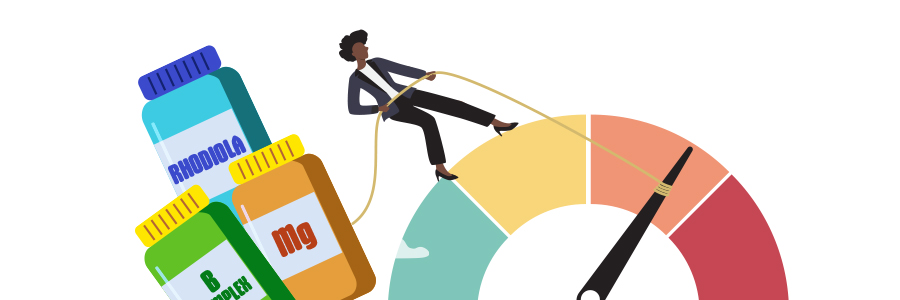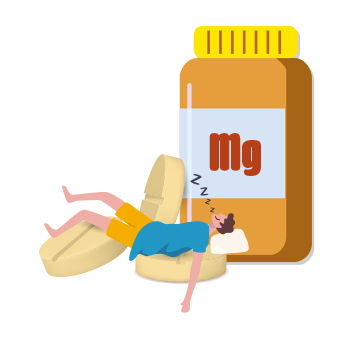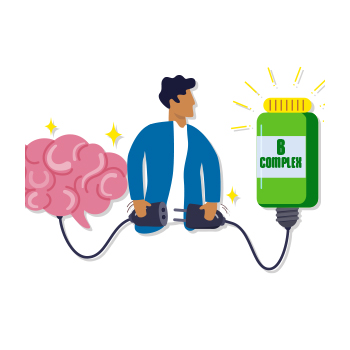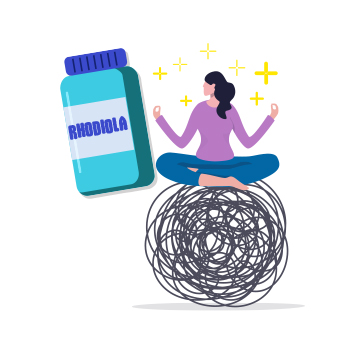


Sign-up for {N}power to get exclusive discounts, newsletters, members-only features, and more!

The world we live in is downright stressful. It’s stressful just thinking about how stressful things have become. While stress is a part of modern-day life, when it runs unchecked, it can wreak havoc, interfering with everyday tasks, relationships, and work. It can also damage the delicate structures of our brains and lead to anxiety and depression. In addition to lifestyle practices such as meditation, yoga, and spending time in nature—all the things we know are helpful to reduce stress, but don’t always do—specific dietary supplements can help the body and mind remain resilient during times of stress, and are actually necessary to ensure that we don’t feel so stressed in the first place.

Magnesium is magnificent for calming frayed nerves, lulling you to sleep, eliminating muscle cramps, and alleviating headaches. Those can all be signs of low magnesium levels, which studies show leads to depression and anxiety-like symptoms, in addition to increased cortisol levels, sleep disturbances, and increased inflammation.1 It’s even more crucial to supplement with magnesium when under chronic and long-term stress. Why? Because when you’re stressed out, your adrenal glands release the stress hormones adrenaline and cortisol into your bloodstream, which leads to an increased loss of magnesium through urine, eventually depleting body stores.2

One form of magnesium, magnesium threonate (MgT), is especially helpful for some of the mood issues related to stress. Researchers discovered that elevating magnesium levels in the brain promoted synapse density and synaptogenesis—the formation of synapses between neurons—in regions critical to cognitive abilities and emotions. Scientists identified MgT as a bioavailable compound that effectively crosses the blood-brain barrier, increasing brain magnesium levels, and thereby improving brain function and reducing depression and anxiety.3 4 MgT has also been demonstrated to enhance learning, memory, and quality of sleep.5 If you’re suffering from a brain imbalance, or are just needing a little extra support from the stresses of life, discovering this mineral might be the missing link to finding your calm.

Taking a B-complex is a terrific approach to covering your bases for total-body health, including brain health, during times of stress. Clinical signs of insufficient intake of B vitamins are mood changes, insomnia, changes in appetite, and sugar cravings. One B vitamin, thiamine (B1), is especially important if you suffer from brain fog. Your brain loves energy, as do the rest of your nerves, and vitamin B1 is a cofactor in a zillion energetic reactions in the brain. Because thiamine is so vital to energy use in the brain, deficiency leads to a reduction of energy available for brain cells, ultimately causing symptoms like confusion, reduced memory, sleep disturbances, and depression.6 One study found that taking 50 mg of B1 daily “was associated with reports of being more clearheaded, composed, and energetic.”7

Just roll with it with rhodiola! This adaptogenic herb has been used to treat anxiety, fatigue, and depression for centuries.8 While it may be foreign to some, the studies speak for themselves. One examined the effects of taking 400 mg of rhodiola extract per day for four weeks in subjects with life- and work-related stress. After just three days, they found significant improvements in markers of stress, such as fatigue, exhaustion, and anxiety.9 In another study investigating the effects of stress-related burnout, rhodiola improved many participants’ symptoms, including stress and depression.10 Rhodiola works with your body to adapt to stress and increases your body’s resistance to stress, allowing you to better cope during stressful times.11
Another nutrient worth noting is bacopa, a nootropic herb, a type of supplement that’s taken for its positive effects on the brain. Supplementation with bacopa has been shown to reduce anxiety and improve mood, increase memory, and is used as a general cognitive enhancer.12 13 Bacopa is known to affect the neurotransmitters dopamine, serotonin, acetylcholine, and gamma-aminobutyric acid (GABA).14 These neurotransmitters are involved in memory, mood, and relieving anxiety.
P.S., one more thing. Phosphatidylserine (PS), pronounced phos·pha·ti·dyl·se(ə)r-ˌēn, is a phospholipid (a type of fat that is an integral part of cell membranes) and is a component of the billions of cells that form your brain. Research has found that PS normalizes stress-related biomarkers—namely cortisol, the “stress hormone”—in chronically stressed individuals.15 One double-blind study showed that short-term PS supplementation improved daily functioning, mental health, and self-reported general wellbeing in older individuals with Alzheimer’s and dementia.16 In fact, memory issues related to chronic stress, the natural aging process, mental health conditions, and insomnia have all been shown to be improved by supplementation with PS.17 18 19
While stress is inevitable, you can make your mind and body more resilient and reduce the harmful effects of stress with stress-relieving supplements. March on with mighty magnesium, bolster your health with beneficial B vitamins, roll with the punches with rhodiola, find your balance with bacopa, and push through life’s stresses with phosphatidylserine.



Sign-up for {N}power to get exclusive discounts, newsletters, members-only features, and more!